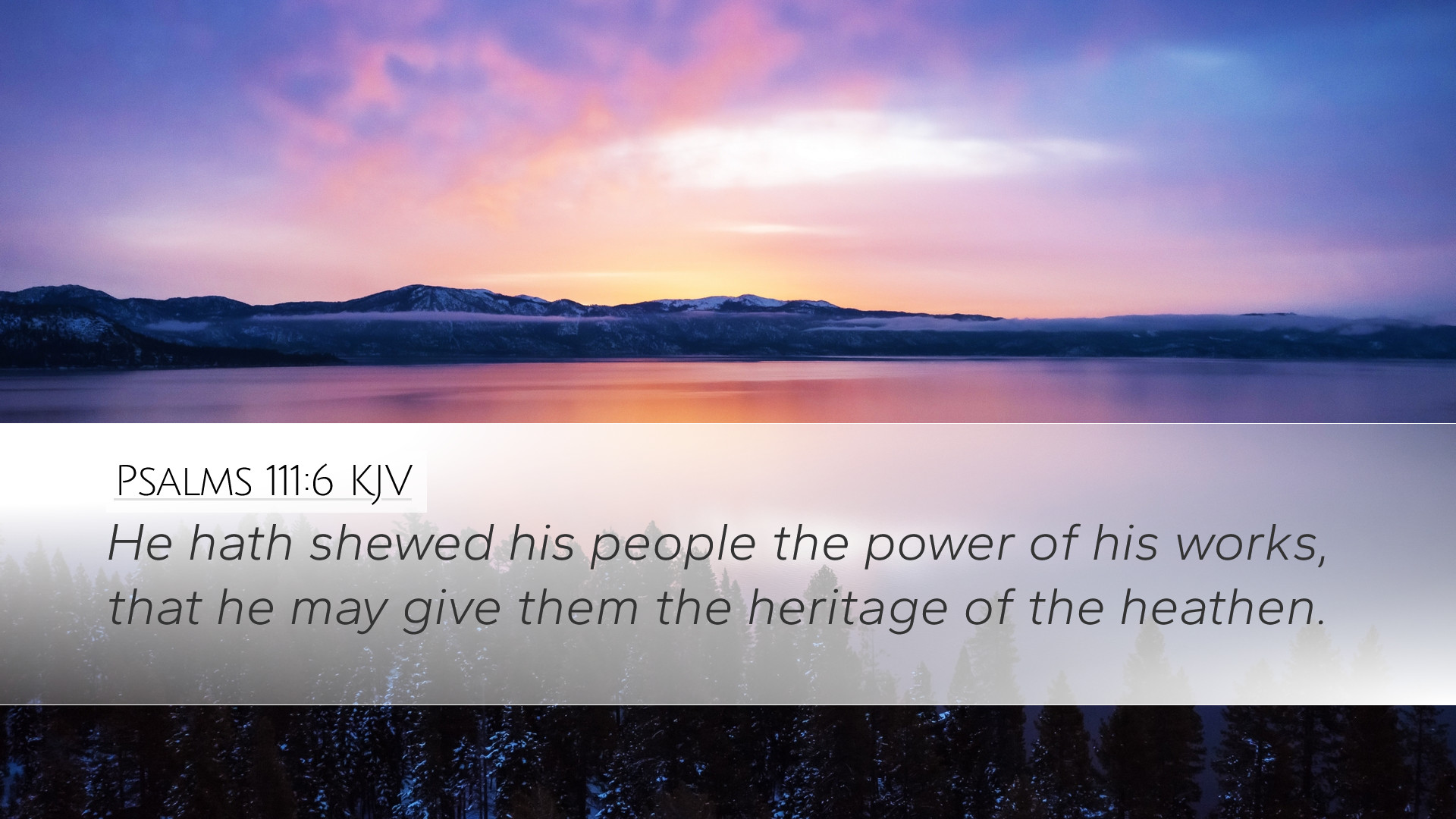Psalms 111:6 - Commentary Overview
Psalms 111:6 reads, "He hath shown His people the power of His works, that He may give them the heritage of the heathen." This verse encapsulates profound theological significance, revealing aspects of God's power, His relationship with His people, and the ultimate fulfillment of His promises. Below, insights from several public domain commentaries are synthesized to provide a deeper understanding of this rich scripture.
Understanding the Verse
This verse is a declaration of God's actions and their implications for His people. The phrase "He hath shown His people" suggests an act of divine revelation. God's works are not mere demonstrations of power but are intended to communicate His nature and intentions toward His people.
The Power of His Works
Matthew Henry emphasizes that the "power of His works" reflects both the might and majesty of God. It implies that the acts of God in history, particularly in salvation and judgment, serve as a testimony to His omnipotence. God's mighty acts include the creation, the deliverance from Egypt, and the miracles performed during the wilderness wanderings.
Henry's Insight:
He notes that these works are intended not only to bolster faith but to inspire praise. The recognition of God's power leads to acknowledgment of His sovereignty, and thus His people are called to respond with reverence and gratitude.
Giving the Heritage of the Heathen
The latter part of the verse, “that He may give them the heritage of the heathen,” can be interpreted in various ways. Albert Barnes posits that this heritage involves the blessings and possessions of the nations that do not know God. In the context of the Israelites, this was a reference to the Promised Land, a gift granted in mercy and grace despite their unworthiness.
Barnes's Perspective:
Barnes articulates this idea further by suggesting that the blessings from God serve a dual purpose: they are both gifts and responsibilities. Such a heritage is meant to draw the nations towards the one true God. This heritage also reflects God's intention to bless others through His people.
Theological Implications
Psalms 111:6 thus serves as a profound statement of God’s engagement with human history. Adam Clarke highlights that understanding the "power of His works" requires a holistic view of scripture—seeing God's plan from creation through redemption. His works are progressive revelations of His character and His intentions toward humanity.
- Clarke's Emphasis: Clarke argues that God reveals His works to instill faith and obedience among His people. When believers reflect on divine acts, they are reminded of their identity as recipients of grace and the responsibilities that accompany such grace.
- This Heritage: Clarke also remarks that the "heritage of the heathen" can be seen as a foreshadowing of the expanding Kingdom of God, which invites all nations to partake in the gospel's promise.
The Community Aspect
This verse also underscores the communal aspect of God's blessings. The Israelites, as a collective body, received God’s inheritance, which calls for unity and collective responsibility. Throughout scripture, the covenant community is expected to give witness to God's works, thereby inviting the nations to know Him.
Matthew Henry Insight:
Henry notes that the blessing of God is not for individual self-aggrandizement, but for collective worship and the manifestation of God’s glory in the world. Through their heritage, they are to reflect God’s grace, leading to the ultimate expansion of His Kingdom.
Modern Application
For modern readers, Psalms 111:6 speaks volumes regarding the nature of God in the Christian experience. The recognition of God's works prompts questions of how believers can continue to share the love and power of God with others. The command to share their "heritage" ties into the Great Commission, urging believers to make disciples of all nations.
- Pastoral Reflection: Pastors can draw on this verse to encourage their congregations to remember and proclaim God’s past works in their lives and history.
- Theological Study: Theologians may grapple with the implications of God's sovereignty over nations and His call to the church to be a missionary entity that reflects His glory.
- Personal Application: For individual believers, reflection on this verse invites a deeper understanding of God’s purpose in their lives and highlights the blessings that come through obedience and faith.
Conclusion
Psalms 111:6 serves as an important reminder of the character of God—a God who reveals Himself through powerful works and desires to bless His people with a meaningful inheritance. This verse calls for reflection on the faithfulness of God, a commitment to unity in worship, and a charge to witness to God’s goodness in a world that desperately needs it.


